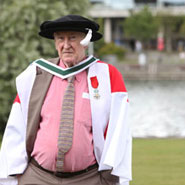Posted 20 June 2011
Text of the introductory address delivered by Mr Brian Donnelly, UCD School of English, Drama and Film, University College Dublin on 16 June 2011, on the occasion of the conferring of the Degree of Doctor of Literature, honoris causa on John Montague
From the publication in 1958 of Forms of Exile to Collected Poems in 1995, John Montague has achieved the status of one of the major poets writing in the English language. His journey has followed a creative map that has taken in points of contact and influence from his very early years in Brooklyn, his childhood and youth in rural Co. Tyrone, his formal education in St. Patrick’s in Armagh and his undergraduate studies in University College, Dublin. His informal education has been shaped by his extensive contact with French life, literature and culture as well his deep engagement with poetic modernism, especially during his periods in Yale and in Berkeley and as a participant in the Iowa University Writers’ Workshop. These shaping geographies have, in his most memorable verse, led back to Garvaghey, in the Irish Garbh acaidh, the rough field of his childhood in the Carleton country of rural Tyrone.
Recalling a visit to the family farm in the early 1960s, he wrote, ‘I had a kind of vision, in the medieval sense, of my home area, the unhappiness of its historical destiny. And of all such remote areas where the presence of the past is compounded with a bleak economic future.’ It has been his vocation to give voice to that culture whose long colonial history exploded both literally and metaphorically in 1969. In poems of great elegance and beauty he had already memorialised the archaic world of his childhood: ‘The Rough Field in the Gaelic and rightly named/As setting for a mode of life that passes on:/ Harsh landscape that haunts me,/ Well and stone, in the bleak moors of dream,/ With all my circling failure to return.’ He had, of course, returned frequently in imagination in poems that have become icons of Irish rural memory such as ‘Like Dolmens Round my Childhood…’ and ‘A Lost Tradition’. His long poem of 1972, The Rough Field did more than fondly remember that past; it is a narrative of historical repossession of which he wrote: ‘One explores an inheritance to free onself and others, and if I sometimes saw the poem as taking over where the last bard of the O’Neills left off, the new road I describe runs through Normandy as well as Tyrone.’ We witness here a sensibility steeped in the past yet tuned to the exigencies of the Irish present and the world beyond our shores in which ‘no Wordsworthian dream enchants…’. Never sentimental, yet full of sentiment, his is a talent that can recreate a memory or an emotion with almost preternatural precision. It is a gift that distinguishes him as one of the greatest love poets in English as in the much anthologised ‘Herbert Street Revisited’ or, as in ‘The Country Fiddler’, where the love is that of the grown man for a long departed relation and a way of life that has passed:
My uncle played the fiddle – more elegantly the violin –
A favourite at barn and crossroads dance,
He knew ‘The Morning Star’ and ‘O’Neill’s Lament’.
Bachelor head of a house full of sisters,
Runner of poor racehorses, spendthrift,
He left for the New World in an old disgrace.
He left his fiddle in the rafters
When he sailed, never played afterwards,
A rural art stilled in the discord of Brooklyn.
Such images resonated and, given present circumstances, will continue to resonate in the story of Ireland. John Montague’s gift and mission have been to record memories and to articulate feelings and aspirations of a common humanity, not only in his verse but in his vivid memoirs like The Pear is Ripe (2007) and stories such as those collected in Death of a Chieftain (1964). He combines the role of the Bard in his care of communal memory with that of the poet in Wordsworth’s definition of the calling: ‘a man speaking to men: a man, it is true, endued with more lively sensibility, more enthusiasm and tenderness, who has a greater knowledge of human nature …’. His voice can
Sing a song for the broken
towns of old Tyrone:
Omagh , Dungannon, Strabane,
jagged walls and windows,
Slowly falling down.
He can evoke, too, the natural world with the subtlety and precision of John Keats as in the opening of ‘Woodtown Manor’:
Here the delicate dance of silence,
The quick step of the robin,
The sudden skittering rush of the wren:
Minute essences move in and out of creation
Until the skin of soundlessness forms again.
Such moments form the fabric, the woof and warp of his recreations of our world, and they remind us, in the words of Coleridge, that ‘our genuine admiration of a great poet is a continuous undercurrent of feeling, it is everywhere present, but seldom anywhere as a separate excitement.’ John Montague has blessed us with a body of writing that explores ways of knowing, that stirs our memories, deepens our experiences and enriches our lives.
Praehonorabilis Praeses, totaque Universitas,
Praesento vobis hunc meum filium,
quem scio tam moribus quam doctrina habilem et idoneum esse qui admittatur, honoris causa, ad gradum Doctoratus in Litteris; idque tibi fide mea testor ac spondeo, totique Academiae.
(Produced by UCD University Relations)

